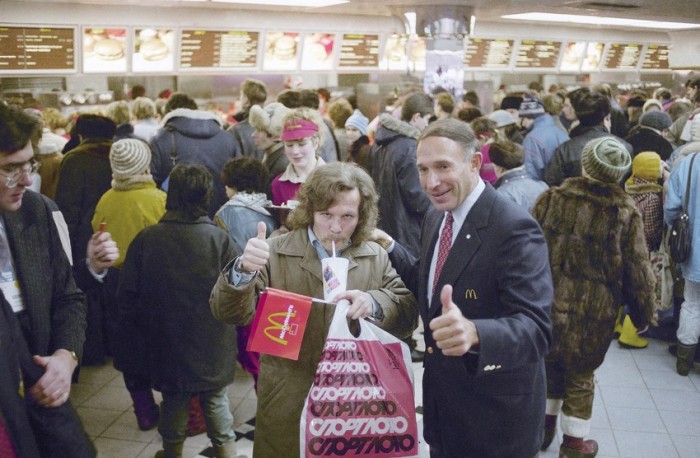Someone quickly phone Andy Vajna, aspiring Hungarian oligarch and pro-regime filmmaker. There’s a great idea coming out of Russian president Vladimir Putin’s inner circle and it is sure to resonate in Prime Minister Viktor Orbán’s Hungary as well. The Russian government has confirmed that it is pumping $13 million (or 680 million rubles) into launching a national and patriotic fast food chain that would rival McDonald’s, especially in the locations where the American hamburger giant has been forced to close following the conflict between Russia and the West over Mr. Putin’s aggression in Ukraine. And President Putin’s people have teamed up with filmmaker Nikita Mikhalkov to spearhead the taxpayer-supported business venture.
Since last year, dozens of McDonald’s restaurants in Russia have been forced to close, either by local officials, due to alleged “health and hygiene violations” or as a result of the on-going embargo of western food products. One of the McDonald’s outlets shuttered by state authorities for “health violations” was the iconic restaurant located in Moscow’s Pushkin Square. This was the first McDonald’s location to open in the Soviet Union, in 1990.
According to the Associated Press, the project is being called “Eat at Home,” and Mr. Mikhalkov’s plan is the “the creation of an alternative to Western fast-food chains.” At least that’s what he told Mr. Putin, in a letter sent to the Russian president in March, asking for his support. The public funding is materializing in the form of a state-backed bank loan amounting to 680 million rubles. If the venture goes belly-up, Russian taxpayers will foot the bill.
As a filmmaker, Mr. Mikhalkov is certainly far more widely recognized than Hungary’s Mr. Vajna. In fact, Mr. Mikhalkov won the 1994 Academy Award for his film Burnt by the Sun. But he is now also one of the staunchest supporters of Mr. Putin in the film industry. The Mikhalkov family has a fairly long and tight history with Russia’s political elites. Mr. Mikhalkov’s father, for instance, wrote the lyrics to the Soviet national anthem.
A McDonald’s spokesperson in Russia put on a brave face when he heard news of Eat at Home. “There’s big potential in the food market in our country. And it’s good that more choices will appear for people,” he told a Russian news agency.

A flashback to 1990: A Russian customer at the first McDonald’s in Moscow gives a thumbs up, standing alongside George Cohon, the chairman of McDonald’s Canada. Photo: Rudi Blaha/Associated Press.
Competing with McDonald’s or with other major western fast food chains isn’t easy, as a small handful of Hungarian start-ups quickly discovered. I recall one such enthusiastic start-up chain opening in Hungary a few years ago, called Gusto Burger. They managed to secure a top location just off of Váci utca and they built their image on selling burgers that were of significantly higher quality than those offered by their main American competitors and for using only local, Hungarian ingredients in their meals. Despite the patriotic fervour, in 2010 the Hungarian owners of Gusto Burger decided to register their company in Panama. And during their slightly more than one year in business, the company kept changing hands with the involvement of businesspeople based in Panama. Gusto Burger went out of business a year after launching.
Of course, Gusto Burger didn’t have direct financial backing from the state, so whatever comes out of the Russian “Eat at Home” venture might stand a better chance. But fast food is a notoriously difficult business, as one of the essential ingredients to success is incredibly high volume, without which one cannot keep prices low and attractive.
Twenty-five years ago–in 1990–McDonald’s opened up in Moscow as a joint venture between the Canadian and Russian governments. When it first launched, a Big Mac ended up costing about a third of the average daily wage of a Soviet worker.
Maybe Mr. Mikhalkov will be able to give McDonald’s a run for its money…with a little help from friends.



